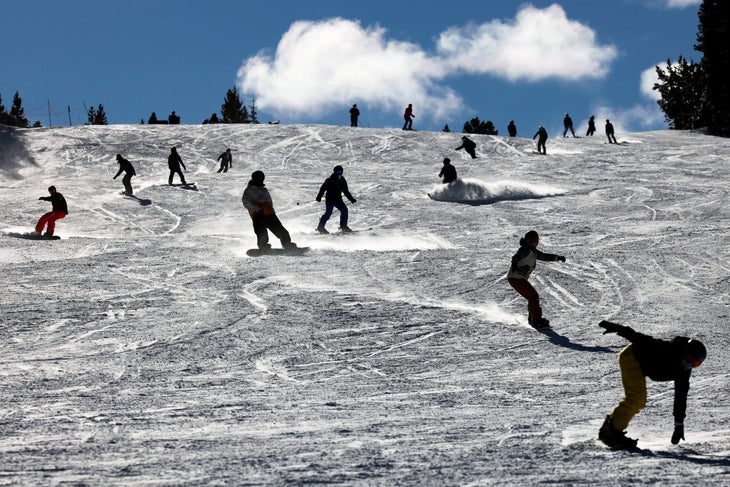Products You May Like
Receive $50 off an eligible $100 purchase at the Outside Shop, where you’ll find gear for all your adventures outdoors.
Sign up for Outside+ today.
If you’ve scanned this website even occasionally over the last few months, you’ve gotten an eyeful about the issues plaguing Vail Resorts this season, from packed parking lots to ski lessons booked up months in advance. Maybe you’ve experienced it yourself.
Back in January, the VR leadership acknowledged the issues and vowed to improve conditions across the board, taking immediate action where possible, such as replacing the General Manager at Stevens Pass and implementing a new bonus structure aimed at retaining workers. Other things, such as the staff shortage that has made it nearly impossible to get all services up and running this season, will take longer.
Yesterday, Vail announced plans to make serious inroads into the staff shortage situation for the 2022-’23 season, with the biggest initiative a minimum wage bump to $20/hour—that’s a 30 percent increase.

In an open letter to employees on March 14, CEO Kirsten Lynch wrote that VR is dedicated to changing its priorities, which “requires a pivotal shift in our company’s direction with a new strategic focus on all of you.” The wage increase applies to all year-round and seasonal employees, both hourly and salaried, at the resorts and the corporate offices. In additional, a $21/hour minimum goes to ski patrollers, maintenance techs, and commercial vehicle drivers. And those are just minimums; wages will be increased based on experience.
But they’re not stopping there. The company wants every seasonal employee to have the chance to make a career with them. Citing Vail Mountain CEO Beth Howard, who started as an F&B intern, and Keystone GM Chris Sorenson, a former liftie, Lynch laid out the new Seasonal Frontline Leadership Development Program. “My goal is to create many more of these opportunities for you,” Lynch wrote to her team. “Leadership development is a passion of mine and I look forward to sharing more with you as we head into next season.”
Sierra Meggitt, a VR employee who’s winding down her second season at Breckenridge, said that the overall message is a positive one. “As someone who’s particularly critical of VR, this letter has slightly melted my cold heart,” she said. “The increase in minimum wage is a good start. It feels like the best thing Kirsten Lynch has sent out all season.”
Social media has been hopping since the letter was posted, with skiers sharing concerns that an investment of this size will cause Epic Pass prices to jump. Epic Lift Lines, an Instagram page with almost 50K followers, went ahead and claimed victory shortly after the letter went public.
Elsewhere on social media, skiers are undecided about how the news will affect them.
“Yet another rate hike in passes, food, lodging. Vail is not spending all this extra money … we are!” commented one person on the Epic Pass Holders page on Facebook, a repository for many complaints about Vail this season. “Employees get a $5 raise, with $5 lunches, and a cup of cocoa will cost us $10.”
Others say it’s a price they won’t mind paying next season. “If it increases season pass prices then so be it,” said Matt Laderwager, who lives in Loveland, Colo., and skis at Keystone and Breckenridge. “I’d much rather pay a little extra to have the mountain working at full capacity so we have reduced lift lines and better customer service.”
A little more vague is VR’s commitment to affordable employee housing, understandably a complicated issue that spans resort communities across the continent. Acknowledging that the current 7,000 affordable housing beds need to be increased, Lynch wrote that the company is prepared to do what’s needed to build more housing on the land they own, and that several projects are already in the works.
“While we understand that some of our mountain communities have concerns about new developments,” said Lynch, “we believe it’s time for us, and our communities, to make affordable housing a top priority and accelerate the processes to ensure we collectively make progress.”

Lynch goes on to debut a new 40-percent employee discount on gear at all Vail-owned retailers (staff already get free passes, dining and lodging discounts, and other benefits), a $4 million investment in Human Resources to correct the effects of a third-party-managed HR system, a commitment to flexible remote work at the corporate level, and a merit increase from 3 to 6 percent for salaried workers.
“Does this solve every concern and piece of feedback you have shared over the past 100 days?” Lynch asked. “No, but I hope they demonstrate our commitment to continued improvements and progress.”
Meggitt is hopeful that employees will finally see meaningful change. “The rest of [Lynch’s] letters have missed the mark,” she says, “but it’s nice to finally see one that portrays that she has been listening.”
In Case You Missed It
What Vail Needs to Fix If It Wants To Retain Skiers—And Their Respect
MLK Weekend Proves Overcrowding Isn’t Necessarily the New Normal at Vail Resorts
Vail Debuts Employee Bonus Aimed at Retaining Staff Amid Record Crowds
Vail Resorts Sold a Record Number of Passes. Now Their Ski Areas Are Facing a Logistical Nightmare.
